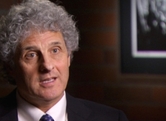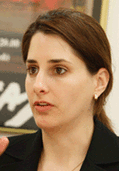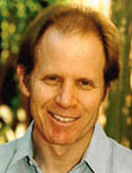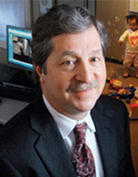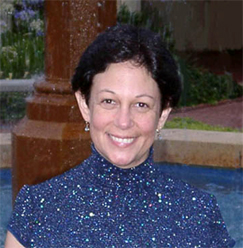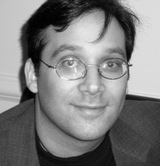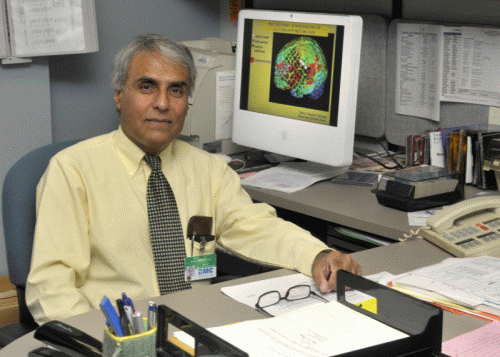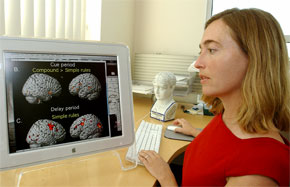Key Researchers
|
Developmental Neuroscience Labs
Dr. Gopnik is an internationally recognized leader in the study of children’s learning and development and was the first to argue that children’s minds could help us understand deep philosophical questions. She is the author of over 100 journal articles and several books including “Words, thoughts and theories” (coauthored with Andrew Meltzoff), MIT Press, 1997, and the bestselling and critically acclaimed popular books "The Scientist in the Crib" (coauthored with Andrew Meltzoff and Patricia Kuhl) 1999, and "The Philosophical Baby; What children’s minds tell us about love, truth and the meaning of life", 2009. She has also written widely about cognitive science and psychology for Science, The Times Literary Supplement, The New York Review of Books, The New York Times, New Scientist and Slate, among others. And she has frequently appeared on TV and radio including “The Charlie Rose Show” and “The Colbert Report”. She has three sons and lives in Berkeley, California with her husband Alvy Ray Smith.
Dr. Patricia K. Kuhl is internationally recognized for her research on early language and brain development, and studies that show how young children learn. Dr. Kuhl's work has played a major role in demonstrating how early exposure to language alters the brain. It has implications for critical periods in development, for bilingual education and reading readiness, for developmental disabilities involving language, and for research on computer understanding of speech. Dr. Kuhl is a member of the American Academy of Arts and Sciences, the Rodin Academy, and the Norwegian Academy of Science and Letters. She was awarded the Silver Medal of the Acoustical Society of America in 1997, and in 2005, the Kenneth Craik Research Award from Cambridge University. She received the University of Washington's Faculty Lectureship Award in 1998, and in the 2007, Dr. Kuhl was awarded the University of Minnesota's Outstanding Achievement Award. Dr. Kuhl is a Fellow of the American Association for the Advancement of Science, the Acoustical Society of America, and the American Psychological Society. In 2008 in Paris, Dr. Kuhl was awarded the Gold Medal from the acoustics branch of the American Institute of Physics for her work on learning and the brain. Dr. Kuhl was one of six scientists invited to the White House in 1997 to make a presentation at President and Mrs. Clinton's Conference on "Early Learning and the Brain." In 2001, she was invited to make a presentation at President and Mrs. Bush's White House Summit on "Early Cognitive Development: Ready to Read, Ready to Learn." In 1999, she co-authored The Scientist in the Crib: Minds, Brains, and How Children Learn (Morrow Press). Dr. Kuhl's work has been widely covered by the media. She has appeared in the Discovery television series "The Baby Human"; the NOVA series "The Mind"; the "The Power of Ideas" on PBS; and "The Secret Life of the Brain," also on PBS. She has discussed her research findings on early learning and the brain on The Today Show, Good Morning America, CBS Evening News, NBC Nightly News, NHK, CNN, and in The New York Times, Time, and Newsweek. Dr. Pfeifer is interested in the neural and behavioral correlates of self perception, social cognition, and emotion reactivity/regulation from middle childhood to middle adolescence. Her neuroimaging research addresses three broad topics:
1. examining developmental changes in the neural bases of self-knowledge retrieval, reflected self-appraisal processes, and other forms of self-evaluation such as that implicated in self-conscious emotions, 2. understanding the development of systems that support advanced perspective-taking and social comparison abilities, as well as the more basic mentalizing mechanisms that facilitate our understanding of other individuals' inner states (including via shared neural representations of our own and others' emotions), and 3. exploring the interplay between networks that react to emotions and those which regulate them, especially as influenced by pubertal development. Dr. Pfeifer has been involved for several years with an ongoing longitudinal study of adolescent brain development. This large dataset (N ~ 90 children in the initial wave) includes structural and functional MRI data, resting EEG, salivary assessments of sex steroid hormones, neuropsychological and behavioral assessments, and more. Dr. Pfeifer has a growing interest in autism research, particularly in the neural bases of their developing self-evaluations, as well as self-conscious emotion processing and emotion regulation. She and her graduate students actively collaborate with Drs. Berkman, Fisher, Moses, and Dishion.
Gary F. Marcus, Ph.D. is Director of the NYU Infant Language Learning Center, and Professor of Psychology at New York University.
Author of The Birth of the Mind: How a Tiny Number of Genes Creates The Complexities of Human Thought, The Algebraic Mind: Integrating Connectionism and Cognitive Science, and editor of The Norton Psychology Reader, Gary’s research on developmental cognitive neuroscience has been published in over forty articles in leading journals such as Science, Nature, Cognition, Cognitive Psychology, and the Monographs of the Society for Research in Child Development. In 1996 he won the Robert L. Fantz award for new investigators in cognitive development, and in 2002–2003 Gary was a Fellow of the Center for Advanced Study in Social and Behavioral Sciences at Stanford. His 2008 book Kluge: The Haphazard Construction of the Human Mind was a New York Times Editor’s Choice. Clinical Professor of Psychiatry and Nursing, served as Director of Medical Studies at the Yale School of Medicine's Child Study Center, where he received the Lifetime Distinguished Teaching award. He also helped found the Performing Arts Medicine Association, and has been in the private practice of infant, child and family psychiatry since 1974.
As president of Zero to Three: The National Center for Infants, Toddlers and their Families, he headed one of the nation's most prestigious multi-disciplinary training programs for infant/family professionals. Both clinician and scholar, Dr. Pruett conducted a landmark study, which demonstrated the powerful, positive impact which early caregiving by fathers can have on a young child's social and intellectual development. Dr. Pruett's writings (including the classic The Nurturing Father, winner of the American Health Book Award, and more current Fatherneed: Why Father Care is as Essential as Mother Care for Your Child and Me, Myself and I: The Child's Sense of Self, which won the Independent Book Publisher's Award), frequent contributions to national and international print and electronic media, and television appearances have provided countless parents with useful information and guidance on early childhood development and effective parenting practices. He serves as consultant to NBC Dateline, ABC News, CBS Morning News, National Public Radio, PBS National Advisory Board, and Sesame Workshop, was chosen by Peter Jennings to co-host the Children's Town Meeting on ABC News the Saturday after 9/11, and by Oprah Winfrey to co-host with her the award winning video for new parents, Begin With Love. Dr. Pruett is affiliated with the American Academy of Child and Adolescent Psychiatry, Society for Research in Family Therapy, World Association for Infant Mental Health, the Yale University Program for the Humanities in Medicine, and the Annenberg Center for Public Policy in the Media. With his wife Marsha Kline Pruett, he is co-investigator in the Collaborative Divorce Project to reduce the trauma of divorce in young children's lives, co-author of Partnership Parenting: How Men and Women Parent Differently-Why It Helps Your Children and Can Strengthen Your Marriage, and the prestigious on-going, multi-site abuse and neglect prevention study, Supporting Fatherhood Initiative for California's Department of Social Service, Office of Child Abuse Prevention.
Emotional development
In the Human Emotions Lab, we study emotions, indexed by a wide variety of procedures, in relation to the development of emotion knowledge, emotion regulation, social and emotion competence, personality, and behavior problems. The theoretical notion that drives our work is that the emotions are central in motivating and organizing perception, cognition, and action. Much of the current research in the lab concerns the development of emotion knowledge, emotion regulation, and key components of emotion competence. A principal goal of our research is to develop a scientific basis for emotion-based intervention programs that prevent behavioral disorders and facilitate the development of social and emotion competence. A relatively new activity in the lab consists of translating research into practice--clinical, school, and community programs. Based on differential emotions theory and findings from basic research in our lab and others, we have constructed an emotion-centered prevention program for preschool children, particularly children at risk for behavior problems and psychopathology. Current graduate students have presented at SRCD and APA and are authoring or coauthoring several papers. For example, some of these papers showed that a child's ability to detect emotion signals and understand the causes of emotion feelings was associated with indexes of the child's emotion competence and academic competence. Harry Chugani, M.D., the Rosalie and Bruce Rosen professor of Neurology and chief of Pediatric Neurology for the Wayne State University School of Medicine and Children’s Hospital of Michigan, has edited a new book detailing the breakthroughs in imaging in the study and treatment of epilepsy.
Dr. Chugani, who also serves as director of the Positron Emission Tomography Center for the School of Medicine and Children’s Hospital of Michigan, edited “Neuroimaging in Epilepsy,” a compilation of every imaging technique used to study the condition by world experts in the field. Dr. Bunge uses behavioral and brain imaging techniques to examine how we control our thoughts and actions to make them consistent with our internal goals. Her goals are to elucidate the mechanisms underlying control processes, as well as to characterize the nature of the contributions of the prefrontal cortex and associated brain regions to cognitive control, in children and adults.
The Bunge lab’s three main lines of research: 1. The impressive array of human cognitive abilities arises from interactions among a set of core mental processes, just as a complex structure can be built from simple pieces. We design experiments to isolate some of these core processes. 2. Cognition is ‘built’ as the brain matures. We are engaged in a large study tracking the neural changes that underlie the emergence of high-level cognition across ages 6-19. In addition to studying typically development, we conduct research involving children with focal brain damage or Tourette Syndrome. 3. Experience influences how the brain is ‘built’, and how it functions throughout life. We are currently studying experience-dependent brain plasticity in young adults, examining whether and how changes in mental habits can alter brain function. We seek to extend this research to the study of brain plasticity in children. |
- Home
- Overview
-
Understanding Hate
- Introduction
- What is Hate? >
-
The Roots of Hate
>
- Early Imprints >
- What Are We Doing To Our Children? >
- Effects of Trauma and Abuse >
- Causes and Effects of Bullying
- Trauma, bigotry, violence linked
- Authoritarian Upbringings >
- Absolutism and Insularity >
- Papers: Early Roots of Prejudice
- Impaired Cognition >
- The Violent Brain >
- Roots of Violence and Cruelty >
- Ghosts of the Past >
-
How Hate Manifests
>
- Hate in the News >
-
Group Influence
>
- Social Defenses >
- Fanning the Flames >
-
How We Fool Ourselves
>
-
Brain and Belief
>
- Search for Certainty >
- Index: All Biases, Distortions and Influences
-
Overcoming Hate
- Overview of Topics
- Introduction
-
Prevention
>
- Education >
-
Intervention
>
- Social Support and Inclusion >
- Helping Children in Dire Conditions >
- Preventing Violence and Bullying >
- Standing Up To Prejudice, Racism, and Bigotry >
- Training Our Protectors >
- Healing the Hurt >
- Educating Our Leaders >
- Resolving Conflict >
- Israel-Palestine >
- Promoting Dignity >
- Healing the Ghosts of the Past >
- Restorative Justice >
- Confronting Mass Atrocities >
- Social Advances >
- More Solutions >
-
Resources
- Tools
